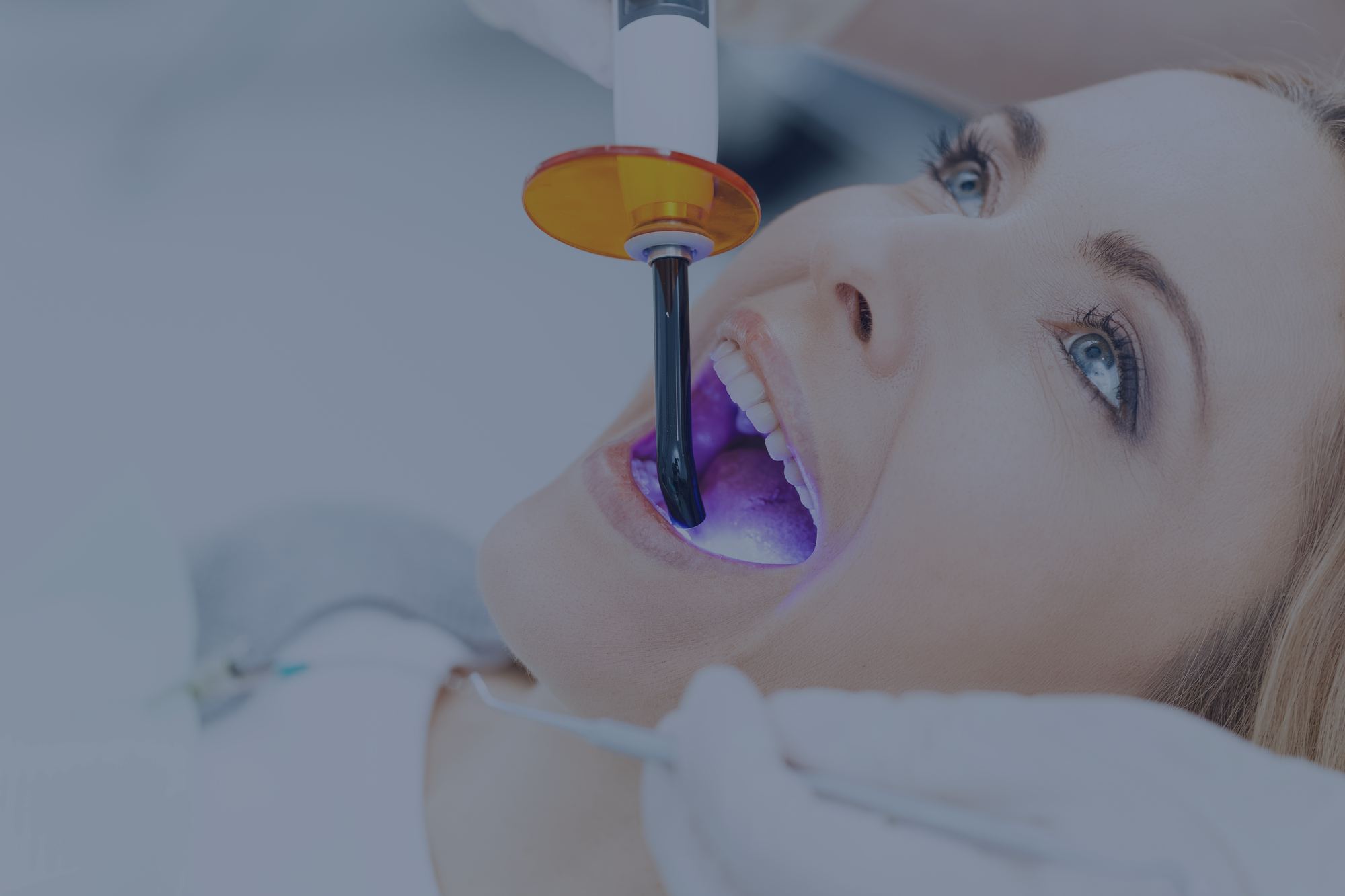SCHEDULE AN APPOINTMENT!
When it comes to overall dental health, one of the best things parents can do is make sure their children receive proper pediatric fluoride treatments. Not only does supervised and professional fluoride application help prevent cavities, but it also helps strengthen the enamel on developing teeth.
While most foods contain some natural levels of fluoride, a clinical appointment may be required if your child is identified as having an increased risk for tooth decay or other dental issues.
Getting fluoride treatments for your teeth is an easy and effective way to keep them safe from decay. Keels Family & Cosmetic Dentistry offers the highest quality of fluoride treatments, using advanced technology to ensure optimal results. Our experienced dentists can customize your treatment plan based on your needs, considering any existing dental conditions or concerns.
With our top-notch fluoride treatments, you can rest assured that your teeth will be in great shape for years.We totally get how crucial it is to prevent dental issues, and we’re here to support our patients in keeping their smiles healthy. Our fluoride treatments provide extra protection against cavities and tooth decay, making them an ideal choice for those looking to preserve their oral health.
How Often Should I Get a Fluoride Dental Treatment?
The frequency of fluoride dental treatments can vary depending on individual oral health factors and professional recommendations.
However, here are some general guidelines regarding the frequency of fluoride treatments:
Children
Children often benefit from more frequent fluoride treatments due to their higher risk of tooth decay. Give your child’s teeth the extra protection they deserve with fluoride treatments every six months during their regular dental check-ups. These treatments can help strengthen their developing teeth and protect against cavities.
Adolescents and Adults
Fluoride treatments every six to twelve months during dental visits are typically sufficient for adolescents and adults with a low to moderate risk of tooth decay. However, individuals with a higher risk of cavities, such as those with a history of tooth decay or certain medical conditions, may benefit from more frequent fluoride treatments. Our expert dentist will assess your oral health and gear you up with personalized recommendations.
Special Cases
Some individuals may have specific dental conditions requiring more frequent fluoride treatments. For example:
- Individuals with orthodontic appliances (braces) may be advised to receive fluoride treatments every three to six months due to the increased risk of plaque buildup and tooth decay associated with braces.
- Individuals with a history of radiation therapy or those experiencing dry mouth (xerostomia) may require more frequent fluoride treatments to counteract the effects of reduced saliva flow.
Regular dental check-ups and consultations with your dentist are crucial in determining the most appropriate frequency of fluoride treatments for you.
Additionally, it’s worth noting that maintaining good oral hygiene practices, including proper brushing and flossing techniques, fluoride toothpaste, and a balanced diet low in sugary foods and drinks, can contribute to cavity prevention and overall oral health.
Remember to consult with your dentist to assess your specific oral health needs and receive personalized recommendations regarding the frequency of fluoride dental treatments.
Fluoride treatments every six to twelve months during dental visits are typically sufficient for adolescents and adults with a low to moderate risk of tooth decay.

What Are Fluoride Treatments?
Fluoride treatments can help to prevent tooth decay and cavities. Fluoride is a mineral that occurs naturally in most foods and water sources, as well as in some forms of toothpaste and mouth rinses.
During a fluoride treatment, your dentist will apply professionally-applied concentrated fluoride directly to the teeth. This helps to strengthen enamel, which helps to protect your teeth from tooth decay and cavities.
These are generally recommended for children over the age of three, as it is at this stage that their teeth are most susceptible to damage from tooth decay and cavities.
For adults, fluoride treatments may be recommended if they have a higher risk of developing cavities or already have existing cavities. Depending on the individual, fluoride treatments may be recommended every three, six, or 12 months.
Fluoride treatments can also help to reverse the early stages of tooth decay. This is done by remineralizing the enamel and helping to repair microscopic damage caused by acids produced by plaque.
A professional fluoride treatment works faster and more effectively than over-the-counter fluoride products, so visiting your dentist for regular check-ups and preventive treatments is important.
Types of Fluoride Treatments
Fluoride treatments are essential for maintaining optimal dental health by strengthening tooth enamel and preventing tooth decay. Dentists offer various types of fluoride treatments, each with its unique benefits and applications.
Topical Fluoride Treatments
Topical fluoride treatments are directly applied to the teeth to deliver fluoride benefits to the tooth enamel. The most common types of topical fluoride treatments include:
- Fluoride Varnish: This treatment involves using a brush or applicator to apply a concentrated fluoride varnish to the teeth. The varnish adheres to the tooth surface, allowing for extended fluoride exposure and absorption. Fluoride varnish is highly effective in preventing tooth decay and is suitable for individuals of all ages.
- Fluoride Gel or Foam: Fluoride gel or foam is typically placed in a tray or mouthguard and worn over the teeth for a specified time. The gel or foam contains a high fluoride concentration and is available in different flavors. This type of treatment is commonly used for children and adults who can hold the tray or mouthguard in place.
Professional In-office Fluoride Treatments
Dental professionals perform professional in-office fluoride treatments and provide a higher concentration of fluoride than over-the-counter products. These treatments are recommended for individuals at higher risk of tooth decay or requiring additional preventive measures.
The two primary types of professional in-office fluoride treatments are:
- Fluoride Rinse: During this treatment, a highly concentrated fluoride rinse is swished around the mouth for a specific duration before being spit out. The rinse coats the teeth, strengthening the enamel and protecting against acid attacks.
- Fluoride Gel or Foam Application: Similar to the topical gel or foam mentioned earlier, this treatment involves applying a high-concentration fluoride gel or foam to the teeth using a tray or mouthguard. However, in this case, the application is performed in a dental office under professional supervision.
Prescription Fluoride Supplements
In some cases, dentists may prescribe fluoride supplements in the form of drops, tablets, or lozenges. These supplements are usually recommended for individuals living in areas with low fluoride levels in the water supply or with specific oral health needs. Following the dentist’s instructions regarding the proper dosage and usage of prescription fluoride supplements is important.
Consulting Keels Family & Cosmetic Dentistry is the best way to determine the most appropriate type of fluoride treatment based on your oral health needs and to receive professional guidance on the frequency and application techniques.
Should Kids Get Regular Fluoride Treatments?
One way parents can help ensure their children have healthy teeth is by having them receive regular fluoride treatments. These treatments are usually administered at a dentist’s office and provide additional protection against tooth decay, cavity formation, and cavities. The American Dental Association (ADA) recommends that all children over 2 years old must receive fluoride treatment regularly.
The fluoride treatments are an effective way to reduce the risk of cavities and tooth decay, as it helps strengthen the outer layer of each tooth. This makes it harder for bacteria to take hold and cause damage to the enamel. The treatments also help to remineralize teeth, boosting their natural defenses against decay.
Ultimately, parents should make sure that their children are receiving regular fluoride treatments. Not only will this help protect against cavities and tooth decay, but it can also improve overall teeth health over time.
Additionally, regular visits to the dentist for check-ups and cleanings can further reduce the risk of cavities and tooth decay. By taking these steps, parents can better ensure their children have healthy teeth for life.
Different Stages of Tooth Decay
Tooth decay, also known as dental caries or cavities, progresses through different stages as it affects the structure of the tooth.
Here are the different stages of tooth decay:
Stage 1: Initial Demineralization
The earliest stage of tooth decay involves the demineralization of the tooth enamel, which is the tooth’s outer protective layer. Acid-producing bacteria in the mouth feed on sugars and produce acids that attack the tooth enamel, causing it to lose minerals. At this stage, there may be no visible signs or symptoms of decay, but the enamel is weakened.
Stage 2: Enamel Decay
In this stage, the demineralization process continues, and the tooth decay progresses beyond the enamel into the underlying layer called dentin. Dentin is softer than enamel and is more susceptible to decay. As the bacteria and acid penetrate the dentin, the decay process accelerates. At this point, the tooth may show signs of a white or brownish spot or a small cavity.
Stage 3: Dentin Decay
As tooth decay reaches the dentin, the decay process becomes more rapid. The bacteria and acids break down the dentin, creating a larger cavity. The affected tooth may become sensitive to hot, cold, or sweet substances, and there may be occasional mild pain or discomfort. At this stage, it is crucial to seek dental treatment to prevent further damage to the tooth.
Stage 4: Pulp Involvement
When tooth decay progresses deep into the dentin, it eventually reaches the pulp chamber, which houses the nerves, blood vessels, and connective tissue of the tooth. The pulp becomes infected, leading to inflammation and increased sensitivity. Symptoms at this stage may include severe toothache, sensitivity to temperature, swelling around the affected tooth, and possible abscess formation.
Stage 5: Abscess Formation
If left untreated, the infection from tooth decay can spread to the surrounding tissues, leading to the formation of an abscess. An abscess is a painful pocket of pus that forms at the root of the tooth or in the surrounding gums.
Symptoms may include severe pain, swelling, redness, fever, and general discomfort. Immediate dental intervention is necessary to treat the infection and prevent further complications.
It’s important to note that tooth decay is a progressive condition, and early detection and treatment are essential to prevent the decay from advancing to more severe stages. Regular dental check-ups, proper oral hygiene practices (such as brushing twice daily, flossing, and using fluoride toothpaste), and a balanced diet low in sugary and acidic foods are crucial in preventing tooth decay and maintaining good oral health.
If you suspect you have tooth decay or experience any symptoms, it is important to consult with a dentist for an accurate diagnosis and appropriate treatment. At Keels Family & Cosmetic Dentistry, our main goal is to provide our clients with the best dental services in town!
Give us a call today to learn more about us and our services!
Why Choose Keels Family & Cosmetic Dentistry?
Make An Appointment
At Keels Family & Cosmetic Dentistry, we understand that people choose our practice for a multitude of reasons. Our prime location offers convenience to our valued patients, making it easy to schedule appointments and prioritize their oral health. The trust and satisfaction of our patients, who often refer friends and family, have solidified our reputation as a professional and caring dental office within our community. Our comprehensive services range from cosmetic dentistry to dental care for the entire family, ensuring that we meet the unique needs of every member. We work with various dental insurance plans to make quality care accessible. With flexible scheduling, a warm and welcoming atmosphere, state-of-the-art technology, and a commitment to patient education, we aim to provide not just dental services but also a comfortable and personalized experience. At Keels Family & Cosmetic Dentistry, we prioritize the health and well-being of our patients above all else, fostering a strong personal connection with each individual who walks through our doors.



